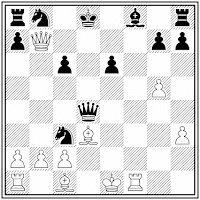White's normal plan is now to play 11.bxc3, followed by kingside castling. But there is a another move, eg 11.Rf1 !!
Defending f7 might not be black's best choice, as the prefered 11...Qc7 is answered by 12.Bf4, further winning time and space.
11...Qe7 12.bxc3 Black has blocked his bishop, whilst white cant castle anymore - who is better ? Houdini gives white a small plus after 12...Nd7 13.Kd1
11...Qd7 12.bxc3 with equality, eg 12...Bd6 13.h4 00 14.h5 (equal) or 12...Na6 13.Bf4 (tiny white advantage) or 12...c5 13.Bb2 (white is better).
Black might be willing to take more risk and counterattack with 11...Qxd4 12.Qxf7+ Kd8 13.Qxb7
A very complicated position has occured :
13...Qe5+ 14.Kd2 Nd5 ( black's only chance for an advantage ) 15.Qxa8 Qc7 ( once again, the only chance for a plus ) 16.Ba6 with a small advantage to black. But then again, finding these moves over the board seems very, very unlikely...
13...Qh4+ 14.Kd2 Ne4+ 15.Kd1 Nf2+ 16.Ke2 equal.
13...Nd5 14.Qxa8 Qb6 15.Rf7 with small white advantage
13...Ne4 14.Qxa8 with white winning
13...Nb5 14.Qxa8 with white winning
And finally there is 11...f5 12.gxf6 Qxd4 13.bxc3 Qxc3 14.Ke2 equal, eg 14...Qxa1 15.Qe4
So white might clearly benefit from the preparation when playing 11.Rf1 - it provides an alternative for the 11.bxc3 lines.
In fact, 10...Nxc3 is condemned by theory, but 11.bxc3 Bd6 12.00 ( or 12.Rb1 ) offers only equality for white - so 11.Rf1 is not so bad as it might seem.



No comments:
Post a Comment